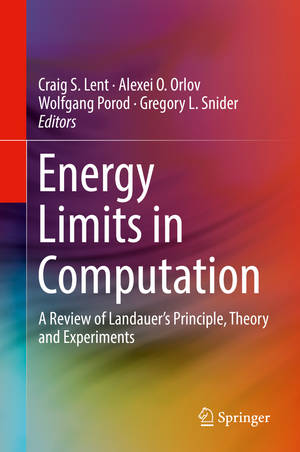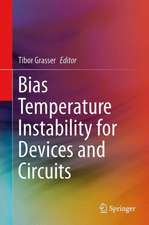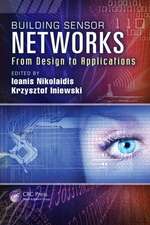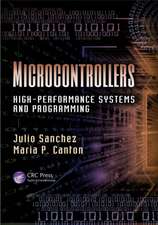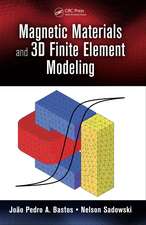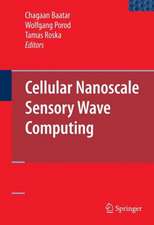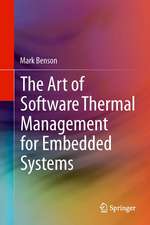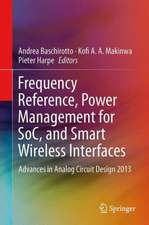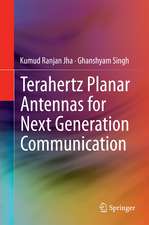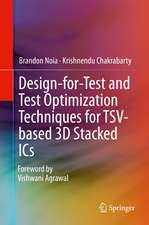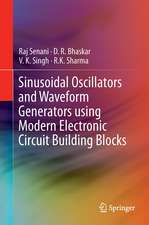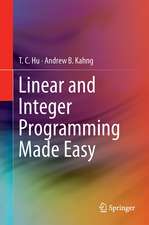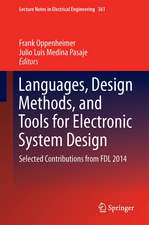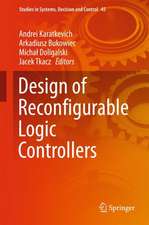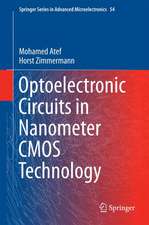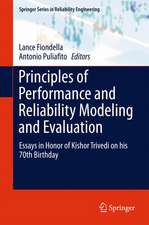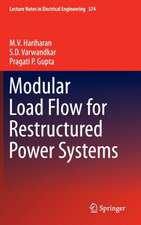Energy Limits in Computation: A Review of Landauer’s Principle, Theory and Experiments
Editat de Craig S. Lent, Alexei O. Orlov, Wolfgang Porod, Gregory L. Snideren Limba Engleză Hardback – 17 aug 2018
- Provides an in-depth investigation of the Landauer principle and how it relates to the possible existence of lower bounds on dissipation in computation;
- Gathers together both sides of thediscussion: those who agree with Landauer and his conclusions, and those who think that Landauer was not correct, offering fresh perspective on the issues in the new light of experiments;
- Offers insight into the future of silicon CMOS and the limits if any to progress in computation related to energy dissipation.
| Toate formatele și edițiile | Preț | Express |
|---|---|---|
| Paperback (1) | 942.44 lei 6-8 săpt. | |
| Springer International Publishing – 26 dec 2018 | 942.44 lei 6-8 săpt. | |
| Hardback (1) | 948.47 lei 6-8 săpt. | |
| Springer International Publishing – 17 aug 2018 | 948.47 lei 6-8 săpt. |
Preț: 948.47 lei
Preț vechi: 1156.67 lei
-18% Nou
Puncte Express: 1423
Preț estimativ în valută:
181.55€ • 197.27$ • 152.60£
181.55€ • 197.27$ • 152.60£
Carte tipărită la comandă
Livrare economică 21 aprilie-05 mai
Preluare comenzi: 021 569.72.76
Specificații
ISBN-13: 9783319934570
ISBN-10: 3319934570
Pagini: 243
Ilustrații: XIV, 237 p. 68 illus., 40 illus. in color.
Dimensiuni: 155 x 235 mm
Greutate: 0.53 kg
Ediția:1st ed. 2019
Editura: Springer International Publishing
Colecția Springer
Locul publicării:Cham, Switzerland
ISBN-10: 3319934570
Pagini: 243
Ilustrații: XIV, 237 p. 68 illus., 40 illus. in color.
Dimensiuni: 155 x 235 mm
Greutate: 0.53 kg
Ediția:1st ed. 2019
Editura: Springer International Publishing
Colecția Springer
Locul publicării:Cham, Switzerland
Cuprins
Chapter1: Information and Entropy in Physical Systems.- Chapter2: Conditional Erasure and the Landauer Limit.- Chapter3: Second law, entropy production, and reversibility in thermodynamics of information.- Chapter4: The Thermodynamics of Computation: A Contradiction.- Chapter5: The physics of information: from Maxwell to Landauer.- Chapter6: Experimental Tests of the Landauer Principle in electron circuits, and quasi-adiabatic computing systems.
Notă biografică
Craig S. Lent is the Frank M. Freimann Chair Professor of Engineering and Concurrent Professor of Physics at the University of Notre Dame. He received his PhD in Solid State Physics in 1984 from the University of Minnesota. His field of research is quantum devices and molecular-scale devices. The current research of his group focusses on the fundamental theoretical limits imposed by physics on computing devices. For the past several years his group has been investigating these questions in the context of a new transistor-less paradigm known as Quantum-dot Cellular Automata (QCA), developed at Notre Dame and now the subject of research worldwide.
Alexei O. Orlov received the M.S. degree in physics from the Moscow State University, Moscow, Russia, in 1983. He is currently a Research Professor at the University of Notre Dame, Notre Dame, IN, USA. From 1983 to 1993, he worked at the Institute of Radio Engineering and Electronics, Russian Academy of Sciences, Moscow, Russia. He received the Ph.D. degree in physics of semiconductors and dielectrics from the same Institute in 1990. During that time, he conducted research on mesoscopic and quantum ballistic effects in electron transport of GaAs field-effect transistors. He was a Visiting Fellow at the University of Exeter, U.K. in 1993, and joined the Department of Electrical Engineering, University of Notre Dame, in 1994. His research interests include experimental studies of mesoscopic, single-electron and molecular electronic devices and sensors, nanomagnetics, quantum-dot cellular automata and nanothermoelectrics. He has authored or coauthored more than 150 publications.
Wolfgang Porod currently is Frank M. Freimann Professor of Electrical Engineering at the University of Notre Dame. He received his Diplom (M.S.) and Ph.D. degrees from the University of Graz, Austria, in 1979 and 1981, respectively. After appointments as a postdoctoral fellow at Colorado State University and as a senior research analyst at Arizona State University, he joined the University of Notre Dame in 1986 as an Associate Professor. He also has served as the founding Director of Notre Dame’s Center for Nano Science and Technology (NDnano). His research interests are in the area of nanoelectronics and nanomagnetics, with an emphasis on new circuit concepts for novel devices. He has authored some 600 publications and presentations. He is a Fellow of the IEEE and he has served (2002-2003) as the Vice President for Publications on the IEEE Nanotechnology Council. Over the years, he has been active in organizing Conferences, Special Sessions and Tutorials, and as a speaker in IEEE Distinguished Lecturer Programs.
Gregory L. Snider received his Ph.D. at the University of California, Santa Barbara in 1991, and was a post-doc at Cornell University. He joined the University of Notre Dame in 1994. His research focuses on the design, fabrication, and measurements of micro and nanoelectronic devices and circuits. In the micro regime, his group works on CMOS circuits to study dissipation in computation, as well as to interface CMOS and nano devices. On the nano side, his research focuses on single-electron devices including Quantum-dot Cellular Automata (QCA) and molecular devices. He is author or co-author of approximately 300 publications and conference presentations. He has served as the Associate Chair for Graduate Studies in the Department of Electrical Engineering, an Associate Editor of the IEEE Transactions on Electronic Devices, and is a Fellow of the IEEE.
Alexei O. Orlov received the M.S. degree in physics from the Moscow State University, Moscow, Russia, in 1983. He is currently a Research Professor at the University of Notre Dame, Notre Dame, IN, USA. From 1983 to 1993, he worked at the Institute of Radio Engineering and Electronics, Russian Academy of Sciences, Moscow, Russia. He received the Ph.D. degree in physics of semiconductors and dielectrics from the same Institute in 1990. During that time, he conducted research on mesoscopic and quantum ballistic effects in electron transport of GaAs field-effect transistors. He was a Visiting Fellow at the University of Exeter, U.K. in 1993, and joined the Department of Electrical Engineering, University of Notre Dame, in 1994. His research interests include experimental studies of mesoscopic, single-electron and molecular electronic devices and sensors, nanomagnetics, quantum-dot cellular automata and nanothermoelectrics. He has authored or coauthored more than 150 publications.
Wolfgang Porod currently is Frank M. Freimann Professor of Electrical Engineering at the University of Notre Dame. He received his Diplom (M.S.) and Ph.D. degrees from the University of Graz, Austria, in 1979 and 1981, respectively. After appointments as a postdoctoral fellow at Colorado State University and as a senior research analyst at Arizona State University, he joined the University of Notre Dame in 1986 as an Associate Professor. He also has served as the founding Director of Notre Dame’s Center for Nano Science and Technology (NDnano). His research interests are in the area of nanoelectronics and nanomagnetics, with an emphasis on new circuit concepts for novel devices. He has authored some 600 publications and presentations. He is a Fellow of the IEEE and he has served (2002-2003) as the Vice President for Publications on the IEEE Nanotechnology Council. Over the years, he has been active in organizing Conferences, Special Sessions and Tutorials, and as a speaker in IEEE Distinguished Lecturer Programs.
Gregory L. Snider received his Ph.D. at the University of California, Santa Barbara in 1991, and was a post-doc at Cornell University. He joined the University of Notre Dame in 1994. His research focuses on the design, fabrication, and measurements of micro and nanoelectronic devices and circuits. In the micro regime, his group works on CMOS circuits to study dissipation in computation, as well as to interface CMOS and nano devices. On the nano side, his research focuses on single-electron devices including Quantum-dot Cellular Automata (QCA) and molecular devices. He is author or co-author of approximately 300 publications and conference presentations. He has served as the Associate Chair for Graduate Studies in the Department of Electrical Engineering, an Associate Editor of the IEEE Transactions on Electronic Devices, and is a Fellow of the IEEE.
Textul de pe ultima copertă
This book is a single-source reference to the issues involved in the Landauer principle, which has gained new prominence recently, due to the large amount of heat generated by today’s computers. If Landauer’s principle is correct, there may be ways to build computers that dissipate far less power (corresponding to heat generated) than today’s computers. This book brings together all sides of the discussions regarding Landauer’s principle, both theoretical and experimental, empowering readers to gain better understanding of dissipation in computation, and the limits if any to progress in computation related to energy dissipation. It represents the best and most thorough examination of the important issue of Landauer’s principle that is available in one volume.
- Provides an in-depth investigation of the Landauer principle and how it relates to the possible existence of lower bounds on dissipation in computation;
- Gathers together both sides of thediscussion: those who agree with Landauer and his conclusions, and those who think that Landauer was not correct, offering fresh perspective on the issues in the new light of experiments;
- Offers insight into the future of silicon CMOS and the limits if any to progress in computation related to energy dissipation.
Caracteristici
Provides an in-depth investigation of the Landauer principle and how it relates to the possible existence of lower bounds on dissipation in computation Gathers together both sides of the discussion: those who agree with Landauer and his conclusions, and those who think that Landauer was not correct, offering fresh perspective on the issues in the new light of experiments Offers insight into the future of silicon CMOS and the limits if any to progress in computation related to energy dissipation
